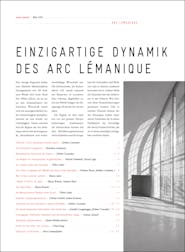Anyone who believes that Zurich and Basel are the undisputed economic powerhouses of Switzerland should cast a glance over the language divide. Over the last two decades, the Lake Geneva region has gathered powerful momentum on both the economic and social fronts.
- A good example is the impressive development of the region’s higher education. The universities of Geneva and Lausanne and the EPFL Swiss Federal Institute of Technology account for 28% of all Swiss students. But they attract a disproportionately large share of the resources, with 34% of third-party research funding – and 43% of EU funding – flowing into the Lake Geneva region since 2010. Particularly attractive internationally is the EPFL, where around 50% of students enroll with a foreign qualification (compared with 33% at the ETH in Zurich).
- Start-up financing is another indicator of lively economic activity. Between 2013 and 2017 half of the venture capital invested in Switzerland was destined for the Lake Geneva region, with only one quarter going to the Zurich area. Besides renowned organizations such as Cern, the Wyss Center, and the Campus Biotech, the numerous multinationals based in the area in sectors such as pharma, and the many small companies that cluster around them, also contribute to the region’s economic development.
- What few members of the public realize is that as well as being home to many international organizations, Geneva is also a leading center of international commodities trading. Five of the ten companies with the highest sales in Switzerland are based there, and operate in this sector. The region accounts for around half of the world’s trading in coffee and sugar, and one third of the trading in crude oil, grain, and oilseeds.
- The arts are also a striking indicator of the region’s agility. More than 30% of Switzerland’s music festivals are held on the shores of Lake Geneva. Since most festivals in Switzerland are self-financed, this statistic also reflects the dynamism and strength of private initiative in the region.
- The Lake Geneva area leads the way in terms of direct democracy and the involvement of the local population: foreigners are allowed to vote in municipal elections and referendums, and in some cases can even stand for office themselves.
Despite all these successes, there are also problems that can’t be ignored.
- The region levies the highest rate of tax in Switzerland. While in Canton Vaud tax revenues have been used to reduce debt, Canton Geneva continues to carry debt of around CHF 37,000 per head of population. In Basel-Stadt, the canton with the second-largest debt burden, the figure is CHF 10,000 per head of population lower. The funded status of cantonal pension funds is low as well, running at 61% in Geneva and 73% in Vaud; this also represents an implicit debt for future generations.
- There are also notorious bottlenecks in the real estate market and the transportation system – both areas where the only hope of lasting improvement lies in a dose of liberal therapy.
The message of the new “avenir special” is clear: Swiss federalism is an extremely successful learning lab where the best ideas can compete and everyone involved can benefit from the range of experiences gathered. The Lake Geneva region also provides Swiss people beyond French-speaking Switzerland with plenty of food for inspiration.





